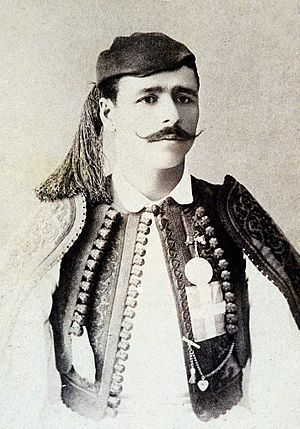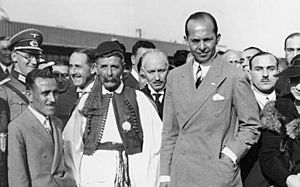Spyridon Louis facts for kids

Spyridon Louis in 1896
|
|||||||||||
Quick facts for kids Personal information |
|||||||||||
|---|---|---|---|---|---|---|---|---|---|---|---|
| Born | 12 January 1873 Marousi, Kingdom of Greece |
||||||||||
| Died | 26 March 1940 (aged 67) Marousi, Kingdom of Greece |
||||||||||
| Sport | |||||||||||
| Sport | Athletics | ||||||||||
| Event(s) | Marathon | ||||||||||
| Achievements and titles | |||||||||||
| Personal best(s) | 2:58:50 (1896) | ||||||||||
|
Medal record
|
|||||||||||
Spyridon Louis (born January 12, 1873 – died March 26, 1940) was a Greek water carrier. He became famous for winning the very first modern Olympic marathon race. This happened at the 1896 Summer Olympics in Athens, Greece. After his big win, people celebrated him as a national hero. Louis was also a soldier, a farmer, and a police officer.
Contents
Early Life of Spyridon Louis
Spyridon Louis grew up in Marousi, a town north of Athens. His family was not wealthy. Louis's father sold mineral water in Athens. At that time, Athens did not have a central water supply system. Spyridon helped his father by carrying and delivering the water.
Preparing for the Olympic Marathon
In 1894, Pierre de Coubertin decided to bring back the Olympic Games. The first modern Olympics were planned for Athens. A new race called the marathon was created for these Games. This idea came from a Frenchman named Michel Bréal. He was inspired by an old Greek legend. The legend tells of a messenger named Pheidippides. He ran from Marathon to Athens. He ran to announce the Greek victory in the Battle of Marathon. After delivering the news, he collapsed and died.
The Greek people were very excited about this new event. They decided to hold special races to pick their marathon runners. These qualifying races were started by Colonel Papadiamantopoulos. Louis had served under him in the military before. The first qualifying race was held on March 22. It was the first marathon race ever. Charilaos Vasilakos won it in 3 hours and 18 minutes. Louis ran in the second qualifying race two weeks later. He finished in fifth place. Colonel Papadiamantopoulos knew Louis was a good runner. He had convinced Louis to try out for the Olympics.
The Olympic marathon race took place on April 10, 1896. The Greek public was very excited about the Games. But they were disappointed because no Greek athlete had won a track and field event yet. It was especially tough when an American, Robert Garrett, won the discus throw. This was a classic Greek event. Because the marathon was so connected to Greek history, people really wanted a Greek runner to win it.
The Historic Marathon Race
In Marathon, Colonel Papadiamantopoulos started the race. There were seventeen athletes, and thirteen of them were from Greece. The race was run on dusty dirt roads. Many Greeks gathered along the roads to watch. The first leader was a Frenchman, Albin Lermusiaux. He had already placed third in the 1500 meters race.
In the town of Pikermi, Louis stopped for a moment. Some say he drank a glass of wine at an inn. His grandson, also named Spyridon Louis, said this was not true. He said his grandfather's girlfriend gave him half an orange. Then he got a glass of cognac from his future father-in-law. After asking how far ahead the other runners were, Louis confidently said he would catch them all.
After about 26 kilometers, Lermusiaux became very tired and dropped out. The lead was then taken by Edwin Flack, an Australian runner. Flack had won the 800 and 1500 meters races. Louis slowly started to catch up to Flack. The Australian was not used to running such long distances. He collapsed a few kilometers later, and Louis took the lead.
During the race, Greek fans were worried when Flack was in first place. But when news came that Louis had taken the lead, the crowd cheered loudly. They shouted "Hellene, Hellene!" Louis was met with huge cheers as he entered the Panathenaic Stadium. This was for the final part of the marathon. Crown Prince Constantine and Prince George of Greece ran with Louis during his last lap. Louis finished the race in 2 hours, 58 minutes, and 50 seconds.
Louis's victory caused huge celebrations. The official report of the Games described it: The King stood up and congratulated him warmly. Some of the King's helpers and committee members even kissed and hugged the winner. Louis was carried in triumph to the changing room. The scene inside the stadium was amazing. Even visitors were caught up in the excitement.
To make the celebrations even bigger, two more Greek runners finished in second and third place. However, the third-place finisher, Spyridon Belokas, was later found to have ridden part of the course in a carriage. He was disqualified. Third place was then given to Gyula Kellner from Hungary.
Life After the Olympics
After his victory, Louis received many gifts from people. These gifts ranged from jewelry to a lifetime of free shaves at a barber shop. It is not known if Louis accepted all these gifts. But he did take home a carriage he had asked for from the king. After the Olympics, Louis stopped his running career. He became a farmer and a police officer.

His last public appearance was in 1936. He was invited as a special guest to the 1936 Summer Olympics in Berlin. During the opening ceremonies, he carried the flag for the Greek team. He also met Adolf Hitler. Louis offered Hitler an olive branch from Olympia. Olympia is the birthplace of the Olympic Games. The olive branch was a symbol of peace.
Louis remembered the moments after his victory: "That hour was something I can't imagine. It still feels like a dream to me. Twigs and flowers were falling on me. Everyone was shouting my name and throwing their hats in the air."
Spyridon Louis passed away a few months before the Italian invasion of Greece in 1940. In Greece, many sports places are named after Louis. These include the Olympic Stadium of Athens. The 2004 Summer Olympics were held there. The road outside the stadium is also named after him.
The movie It Happened in Athens is a story about Louis and the marathon. It is not entirely accurate. His story is also shown in the 1984 TV miniseries The First Olympics: Athens 1896. In Greece, there is an expression "to become Louis." It means "to disappear by running very fast."
Breal's Silver Cup
The silver cup given to Louis at the first modern Olympic Games in Athens was very special. It was sold for a lot of money (£541,250, or about $860,000) at an auction in London. This happened on April 18, 2012, at Christie's. The cup is six inches tall. It broke the record for Olympic items sold at auction. The sale happened on the day Britain marked 100 days until the 2012 London Olympics. Christie's said the auction was "heated" with six bidders. The buyer was later confirmed as the Stavros Niarchos Foundation.
The cup is now shown at the Stavros Niarchos Foundation Cultural Center. This is a project by the Stavros Niarchos Foundation. They promised to make the cup available for everyone to see. While the center was being built, the cup was temporarily shown at the Acropolis Museum in Athens. It was also displayed at the Olympic Museum in Lausanne. This was during the time of the International Marathon of Lausanne.
See also
 In Spanish: Spiridon Louis para niños
In Spanish: Spiridon Louis para niños
 | Delilah Pierce |
 | Gordon Parks |
 | Augusta Savage |
 | Charles Ethan Porter |

